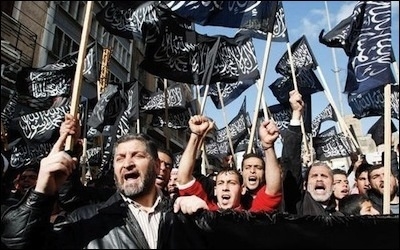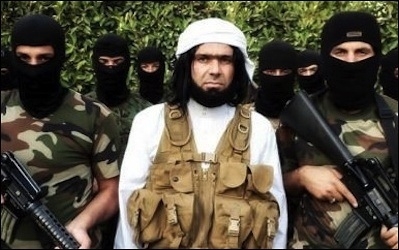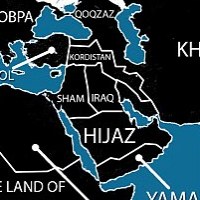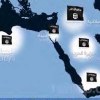![]()
Summer 2015 | The Middle East Quarterly, Volume 22, Number 3 | by Hilal Khashan
The claim by a recent public opinion poll that only 1 percent of adult Lebanese Sunnis are supportive of the self-proclaimed Islamic State of Iraq and Syria (ISIS)[1] must be taken with a large pinch of salt since “there is a vast gulf between how people say they behave and how they actually behave.”[2] In fact, since Lebanese Sunnis are willing to support whoever can defeat their enemies and restore their pride, many of them find ISIS appealing for quite a few reasons: They have an aversion to Shiites and feel estranged from the Lebanese state while harboring nostalgia for the caliphate. Many admire power in any form, and others have a predisposition to anomic terrorism.
Aversion to Shiites

After a long period of Shiite ascendance, the prominence of Rafiq Hariri (left) revived Sunni political hopes in Lebanon, but his assassination in February 2005 crushed expectations. In May 2008, Hezbollah stormed mostly Sunni west Beirut and liquidated the militia of the Future Movement, headed by Hariri’s son Saad (right).
The rise to preeminence of Lebanese Shiites began after the Amal movement evicted the Lebanese army from the southern suburbs of Beirut in February 1984. A year later, Hezbollah made its debut and formed a militia to fight the Israel Defense Forces and its Southern Lebanese Army surrogate.
The Sunnis thus lost political prerogatives that had accrued to them from the 1943 National Covenant with the Maronites. Having already lost the support of the Palestine Liberation Organization due to the 1982 Israeli invasion of Lebanon, Sunnis suddenly found themselves giving way to a new Shiite contender that enjoyed strong regional support.
The appearance of Rafiq Hariri on the political scene in 1992 revived Sunni hopes, but his assassination in February 2005 put a damper on their expectations. In May 2008, Hezbollah stormed mostly Sunni west Beirut and, in a matter of hours, liquidated the militia of the Future Trend movement, headed by Hariri’s son Saad. So after a long period of Shiite ascendance, the Sunni street rejoiced when an ISIS offensive rapidly seized Mosul and a large swath of Iraqi territory in June 2014. As a neighborhood leader in Tripoli put it: “Iraq witnessed a Sunni triumph against Shiite oppression. Forcing Tripoli’s Sunnis to denounce ISIS amounts to coercing them to exercise political self-suppression.”[3] The truth of the matter is that “hatred for Iran and Hezbollah has made every Lebanese Sunni heartily supportive of ISIS, even if its brutal methods will eventually affect them adversely.”[4]
Estrangement from the Lebanese State

A pro-ISIS rally last year in Tripoli, Lebanon’s second largest city. Some Salafi sheikhs have pledged allegiance to ISIS, including Abu Sayyaf al-Ansari and Ahmad Asir.
When Hezbollah shattered the main Sunni leadership, the Lebanese army watched but decided not to interfere. Weak Sunni leadership, both clerical and political, created a vacuum and caused the sect to drift apart and turn to radical Islamic leaders. One such leader was Salafi sheikh Ahmad al-Asir, whose movement had enjoyed the support and loyalty of hundreds of Sidon’s families. They were routed from the city by the Lebanese army and Hezbollah in June 2013. Going underground after the debacle, Asir transferred allegiance from an-Nusra’s Abu Muhammad Julani to ISIS’s Abu Bakr Baghdadi.[5] This defection also underscored the eclipse of the Sunni clerical institution Dar al-Fatwa, which in recent years had been the subject of financial scandals and political weakness. The decimation of the office of the Sunni prime minister, to whom Dar al-Fatwa reports, rendered it rudderless, and it lost its traditional role maintaining the cohesion of the Sunni community.
In addition, some government officials privately admit that ISIS has established itself in Lebanese Sunni areas, including Beirut,[6] and there are examples to support this belief. Government-salaried Sunni clerics in Sidon, the hometown of former prime minister Saad Hariri, were impelled to react angrily to the spate of pro-ISIS wall graffiti in that city and warned that unless the trend was arrested, “Sidon would become a fertile land for breeding terrorism.”[7] The Lebanese army frequently implements large-scale security measures in Sidon, despite insisting that “there is no fostering environment for ISIS in the city.”[8]
In Tripoli, Lebanon’s second largest city and its most important Sunni hub, Future Trend parliamentary deputies continue to refuse to admit publicly that ISIS is present in the city, but their denials have failed to hide “the existence of a radical Islamic environment in the city.”[9] Several attacks on Lebanese army patrols and pro-Hariri activists in Tripoli succeeded in preventing formation of Iraqi-type awakening councils.[10] But the city is fully controlled by the army, internal security forces, and military intelligence. ISIS supporters are mainly located in its at-Tibbane neighborhood and are well known to the authorities, which choose to ignore them.[11] Pro-ISIS rallies outside mosques are commonplace in Tripoli after Friday prayers.[12] The twin explosions in January 2015 that rocked Tripoli’s Alawite Jabal Muhsin sector were ordered by ISIS operatives in Rumye prison in the hills overlooking Beirut. It was only then that the embarrassed Interior Ministry decided to dismantle ISIS’s operations room in the prison’s Block-B.[13] Even a cursory look at the situation leads to the conclusion that “ISIS does not need to come to Tripoli. It is already there.”[14] Dealing with the threat posed by ISIS is probably why the Interior and Justice portfolios in Tammam Salam’s cabinet were given to Future Trend figures.
But despite its anti-Sunni orientation, the army is careful not to get embroiled in confessional politics. Mindful that it disintegrated twice (in 1976 and in 1984) when it unabashedly took sides, the army command is obviously not interested in a third upheaval and seems to be keenly aware that Sunni approval of ISIS is a function of public distrust of the state machinery, including the military. Even though several Sunni soldiers have defected to an-Nusra and ISIS, the army command dismissed these as isolated cases.[15]
Local observers note that the “seed of ISIS terror is found in every depressed area of Lebanon.”[16] Support for ISIS grows as Sunnis lament the sad state of their coreligionists in Iraq and Syria, comparing it to their own situation as Iranian-backed Hezbollah continues to exercise hegemony over Lebanese politics. Rising Sunni anger and ISIS’s successes do not bode well for Lebanese political stability.[17]
Pining for the Caliphate
Unlike Shiites, who believe that the caliphate usurped the rights to the succession of Muhammad’s household, Sunnis have viewed the caliph as their legitimate leader for thirteen centuries. Yearning for a resurrection, the caliphate continued to live on after its 1924 abrogation by Turkey’s Kemal Atatürk as Sunnis “view it as the state of Muslim glory and justice.”[18] Its reestablishment, for example, was the raison d’être of Hassan Banna’s Muslim Brotherhood, founded in 1928. Lebanese Sunnis also find the neo-Ottoman policies of Turkey’s ruling Justice and Development Party appealing and are particularly fond of Turkish president Recep Tayyip Erdoğan.[19]
Obsession with the caliphate has not spared Sunnis from delusional thinking. Arab fondness for Hitler is well documented, at times to the point of asserting that the tyrant viewed Islam and its culture with favor.[20] As Daniel Pipes points out: “Nazis portrayed Islam as an ally and, accordingly, called for its revival while urging Muslims to act piously and emulate Muhammad.”[21] It is also not rare for some Arabs to argue that Napoleon converted to Islam and sought to create a great Muslim empire.[22] In June 2014, ISIS’s Baghdadi announced the formation of the Islamic State and designated himself caliph. Given his extreme bloodletting, even against fellow jihadists, the announcement did not generate wide approval. However, the sight of cruising motorists in Sunni areas blowing their horns—the Lebanese tradition of expressing happiness—after Baghdadi’s announcement sent a muted message of approval. The issuance of the Islamic State’s passport was another cause for pride. It is difficult for Sunnis to disavow the inscription on IS’s passport that reads, “We will deploy armies for the holder of this passport, if harmed.”[23]
Admiration for ISIS Power

Shakir Wahiyib is one of the chief executioners for ISIS and one of the few willing to bare his face during executions. ISIS resorts to such ruthless tactics without regard to human cost. The group’s rationale considers the use of power, as gross and as graphic as possible, as requisite to the subjugation of enemies. A flag vendor in Tripoli explained the popularity of ISIS: “People … like whoever is strong.”
Islam literally means submission to legitimate religious authority: “Believers, obey God, His Messenger, and those charged with authority among you.”[24] This imperative may well dispose believers to revere power and display intolerance for dissenting voices. Using Bin Laden’s famous strong-horse metaphor, Lee Smith argues that the “Sunnis have been a bloc of force that has never known accommodation or compromise, but has rather compelled everyone else to submit to its worldview.”[25] Because of the central role of the caliph in enforcing the Shari’a and spreading the faith to all corners of the globe, the “Sunni figure has often been the able statesman, the hero of conquests, or the victory-maker.”[26] In a study on Lebanese college students’ reaction to Iraq’s invasion of Kuwait in August 1990, 82 percent of Sunni respondents chose Saddam Hussein as their preferred political leader. When U.S. president George Bush initiated Operation Desert Shield to prepare for the liberation of Kuwait, Hussein ordered the apprehension of several hundred Western nationals to deter U.S.-led military action. In response to a question on this, 98 percent of Lebanese Sunnis “thought the Iraqis were justified in taking Western hostages.”[27] Even Venezuela’s late president Hugo Chavez’s “anti-Israeli pronouncements enamored him to an Arab public hungry for a charismatic leader in the mold of Nasser.”[28]
ISIS is no exception to the customary approach of Muslim power projected through strong leadership. If anything, it has exaggerated the use of coercion and carried it to new heights. ISIS adopted Abi Bakr Naji’s gruesome publication titled The Management of Savagery[29] as a means to apply Sayyid Qutb’s treatise Ma’alim fi-l-Tariq (Milestones).[30] The rationale is that only extreme terror can help construct the Islamic state on the ashes of degenerate apostate regimes. The use of awesome power, as gross and as graphic as possible, is requisite to the subjugation of enemies. As the jihadist sheikh Hussein bin Mahmud once said, “Let them [our enemies] find ruthlessness in you.”[31]

ISIS has had success in recruiting from a pool of alienated and radicalized Muslims as well as impoverished individuals. The Lebanese executioner Abu Asma al-Australi (above) abandoned his wrestling career to join the ISIS jihad. ISIS also succeeded in recruiting at least two Lebanese Christians from Tripoli to its ranks.
In its war in Syria and Iraq, ISIS resorts to ruthless tactics without regard to human cost. To win the battle for Tabaqa airbase in northeastern Syria, eventually overrun in August 2014, ISIS did not mind losing twice as many militants as government troops.[32] What matters more for ISIS was to strip Iraqi and Syrian soldiers to their underwear and march them to their humiliating death in order to project invincible power. Kobani is another example of ISIS’s efforts to achieve spectacular triumphs regardless of the cost. ISIS lost more than one thousand fighters before admitting that it had been driven out of the town by coalition airstrikes, even as it promised it would return to attack.[33] It avenged its defeat by burning a captured Jordanian pilot to death and parading Kurdish Peshmerga prisoners of war in metal cages.[34]
Like most Muslims, Lebanese Sunnis see themselves as the victims of centuries of backwardness, marginalization, and defeat. They tend to favor any signs, however elusive, that signal reversing Sunni weakness. A flag vendor in Tripoli explained the popularity of ISIS: “[P]eople … like whoever is strong.”[35] Poor, angry and marginalized teenagers in Tripoli want “great victories.”[36] Even though public display of support for ISIS in Lebanon is punishable by law, “any young man in Tripoli, if asked, would confess how much he admired its power.”[37] When confronted with the brutality and viciousness of ISIS, its supporters often lean on the Qur’an to justify their position: “Muhammad … and those with him are firm of heart against the non-believers, compassionate among themselves.”[38]
A Destination for the Alienated
There are reasons other than piety for Lebanese to join ISIS and other radical religious movements. Hezbollah fighters searching the bodies of Sunni militants in Syria often report finding spoons and personal memos about their scheduled lunches in heaven with the Prophet, as well as their first rendezvous with the promised seventy-two virgins.[39] But maladapted immigrants in the West also turn to militancy, and troubled individuals desperate for emotional freedom seek shelter in the crowd to avoid responsibility while indulging in abominable actions. Even scores of Muslim women in the West chose to join ISIS after Baghdadi declared the formation of the Islamic State. “Socially isolated and depressed … [m]any of them suffer from a lack of purpose in their daily lives.”[40]
Just as alienation can affect individuals from different walks of life, joining ISIS has appealed to recruits from a broad socioeconomic spectrum. Thus, Muhammad Emwazi, the British-educated butcher of ISIS, came from a well-to-do family in London[41] as did Egyptian soccer referee Mahmud Ghandur, who chose to abandon his promising career to join ISIS.[42] The Lebanese executioner called Abu Musab al-Australi abandoned his wrestling career and the comfort of Australia to answer the call of jihad and to mentor his 7-year-old child in the art of beheading.[43] The pool of alienated and radicalized youth did not just include maladjusted Muslim immigrants in the West or rising stars feeling empty inside and searching for meaning, but also poor persons saddled with the problems of poverty and crime. ISIS also succeeded in recruiting at least two Lebanese Christians from Tripoli to its ranks. The clichéd rationalization for their metamorphosis stresses ISIS’s taking advantage of the city’s “poor financial conditions to recruit them.”[44]
More Trouble in the Making
What is happening in Syria and Iraq is a religious war with ethnic overtones. As a microcosm of the region’s religious and ethnic conflicts, it is difficult to imagine how Lebanon can be spared. The return of Saad Hariri to Lebanon to initiate dialog with Hezbollah, after years of self-exile, is linked to soaring Sunni extremism and Saudi determination to reverse it.[45] The eventual curtailment of ISIS’s presence in Syria and Iraq will take time, and it is unlikely that the group will be completely eliminated. But Lebanon already presents some of its hardened members with a convenient sanctuary since “it is an established fact that Arsal and Ain al-Hilwa Palestinian refugee camp near Sidon are sanctuaries for ISIS and other radical Islamic movements.”[46]
Furthermore, while there are no accurate figures about the number of Syrian refugees in Lebanon, this group is thought to exceed one million persons. Among them, thousands of Islamist militants masquerade as refugees. Lebanon’s tenuous security situation largely depends on the whim of regional countries patronizing its antagonistic sects. In view of the spread of sectarian conflict in the region — and in the event it becomes permeable to its external environment — these refugees might well become Lebanon’s Trojan horse.
Arabs missed their chance for religious reform in the nineteenth century, but the developments of the past few years suggest they are confronting the old problem. Lebanon is not exempt. When pressed to issue an anti-ISIS statement, Muhammad al-Juzu, a prominent Sunni Lebanese cleric, said only that “Hezbollah was a more difficult problem than ISIS.”[47]
In view of the increasing sectarian tone of Hezbollah’s military intervention, not only in Syria but also Iraq and Yemen, one can expect Lebanese Sunnis to support its ISIS nemesis, however ephemerally. And while it is difficult to know the extent of this support, it is plausible to believe that it exceeds single digit levels.
Hilal Khashan is a professor of political science at the American University of Beirut.
![]()
Notes:
[1] David Pollock, “Isis Has Almost No Popular Support in Egypt, Saudi Arabia, or Lebanon,” Washington Institute for Near East Policy, Washington, D.C., Oct. 14, 2014.
[2] Steven D. Levitt and Stephen J. Dubner, Super Freakonomics: Global Cooling, Patriotic Prostitutes, and Why Suicide Bombers Should Buy Life Insurance (New York: Harper Perennial, 2011), p. 7.
[3] An-Nahar (Beirut), June 27, 2014.
[4] Liban Space (Beirut), Oct. 14, 2014.
[5] El-Badil (Cairo), Feb. 1, 2015.
[6] El-Marada (Beirut), July 3, 2014.
[7] National News Agency (Beirut), Oct. 7, 2014.
[8] Al-Balad (Beirut), Oct. 8, 2014.
[9] Elnashra (Beirut), June 28, 2014.
[10] Al-Akhbar (Beirut), Sept. 25, 2014.
[11] As-Safir (Beirut), Dec. 3, 2013.
[12] Al-Hiwar TV (London), Sept. 19, 2014.
[13] Alankabout (Leb.), Jan.13, 2015.
[14] An-Nahar, June 27, 2014.
[15] The Daily Star (Beirut), Oct. 11, 2014.
[16] Al-Afkar (Beirut), June 20, 2014.
[17] The Wall Street Journal, Oct. 21, 2014.
[18] Al-Anba (Kuwait), Aug. 2, 2014.
[19] Ad-Diyar (Beirut), Oct. 14, 2014.
[20] Nahr al-Barid and al-Baddawi refugee camps’ website, accessed Feb. 27, 2015.
[21] Daniel Pipes, review of Nazi Propaganda for the Arab World by Jeffrey Herf, Commentary, Apr. 2010.
[22] Al-Ahram (Cairo), May 29, 2006.
[23] Al-Arabiya (Dubai), July 5, 2014.
[24] Qur. 4:59.
[25] Lee Smith, The Strong Horse: Power, Politics, and the Clash of Arab Civilizations (New York: Doubleday, 2010), pp. 5-6.
[26] Hossam Tammam, “On Difference and Understanding: Al-Husayn, the Shiite Martyr, the Sunni Hero,” Islamism Scope website, Mar. 11, 2004.
[27] Hilal Khashan, “The Revival of Pan-Arabism,” Orbis, Winter 1991, p. 110-2.
[28] Ali Younes, “From Hero to Villain: The Arab World’s Infatuation with Hugo Chavez Arc,” Foreign Policy in Focus (Washington, D.C.), Mar. 15, 2013.
[29] Abu Bakr Naji, The Management of Savagery: The Most Critical Stage through which the Umma Will Pass, trans. William McCants (Cambridge: John M. Olin Institute for Strategic Studies, Harvard University, 2006).
[30] Sayyid Qutb, Ma’alim fi-l-Tariq (Cairo: n.p., 1964).
[31] “Senior al-Qaeda Sheikh,” Special Dispatch, no. 1635, The Middle East Media Research Institute, Washington, D.C., June 27, 2007.
[32] The Independent (London), Sept. 9, 2014.
[33] Ibid., Jan. 31, 2015.
[34] The Daily Mail (London), Feb. 23, 2015.
[35] The Daily Star, July 18, 2014.
[36] The Wall Street Journal, Oct. 21, 2014.
[37] Al-Arabiya, Sept. 9, 2014.
[38] Qur. 48: 29.
[39] South Lebanon organization website, Jan. 26, 2014.
[40] Siamak Nooraei, “Jihadi Motives: Why Do Western Women Join the Islamic State?” Foreign Policy Journal, Jan. 16, 2015.
[41] Al-Arabiya.net (Dubai), Feb. 27, 2015.
[42] Lebanon 24 News (Beirut), Feb. 27, 2015.
[43] An-Nahar, Feb. 19, 2015.
[44] Naharnet (Beirut), Feb. 26, 2015.
[45] Raphael Lefevre, “Tackling Sunni Radicalization in Lebanon,” Carnegie Middle East Center, Beirut, Dec. 24, 2014.
[46] Al-Binaa (Beirut), Jan. 17, 2015.
[47] An-Nahar, June 18, 2014.



 RSS
RSS










Latest Comments
Hello Mike, Thank you for your positive feedback to the article. I felt there wasn’t too much critical analysis of ...
Thanks for this considered and well constructed article. A follow up article on the manner in which the editorial contro...
THE CLUELESSNESS OF CLAIMING THAT OBAMA'S MIDDLE EAST POLICIES WERE A FAILURE CANNOT BE FURTHER FROM THE TRUTH, WHAT THE...
As long as Obama is the president of the usa do not trust the us government......
Thank you for an good read....